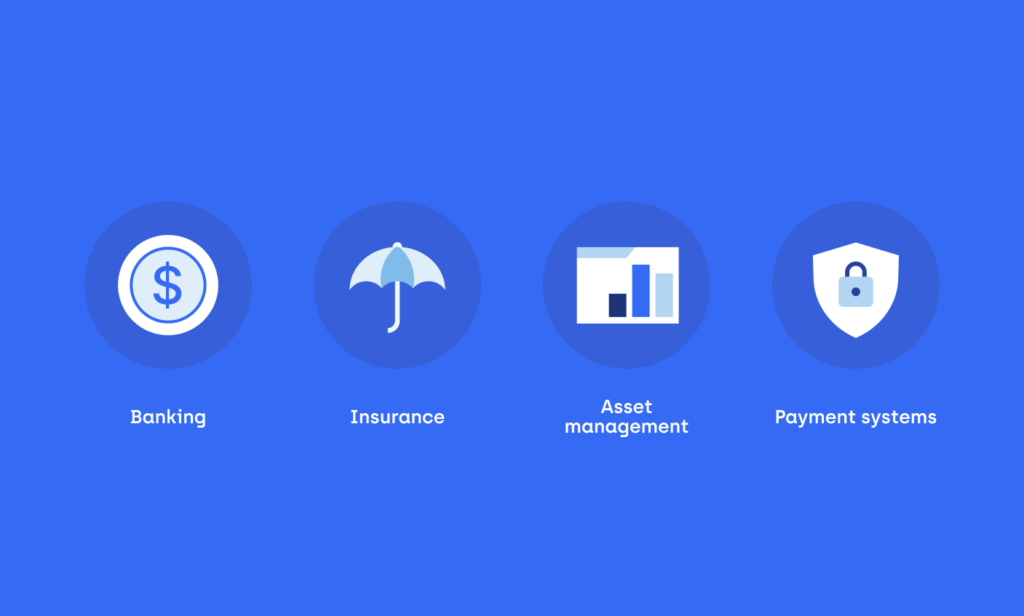Hyperledger In The Financial Services Industry – Overview Of The Trends
Mikołaj Zakrzowski

Web 3.0 is starting to play a vital role in modern society. Financial Sector is using a wide variety of new tools – including Hyperledger projects. Learn how to use it to your advantage.
What You Should Know About Financial Services Sector
The financial services industry is a broad term encompassing a range of businesses providing financial products and services to individuals and corporations.
To understand its area of expertise, you should know that it includes traditional banks, investment banks, insurance companies, asset management firms, and other financial institutions.
The financial services industry is critical to the functioning of the global economy. As it provides essential services that facilitate the movement of money and capital.
Financial service providers are crucial in allocating capital, managing risks, and facilitating financial transactions.
The key segments of the financial services industry include:
- Banking: This segment includes commercial banks, investment banking, and other financial institutions. They provide banking products and services such as business and personal loans, deposits, and other financial products.
- Insurance: This segment includes insurance companies that offer a range of insurance products, such as life, health, and property insurance.
- Asset management: This segment includes asset management firms responsible for the investment management of portfolios on behalf of individuals and institutions and their financial planning.
- Payment systems: This segment includes companies that provide payment processing services such as credit cards, debit cards, and other electronic payment systems.
 The key segments of the financial services industry.
The key segments of the financial services industry.
What Are The Key Issues In The Financial Sector?
The financial sector is one of the key players in the way the modern world works. As a result, it faces multiple issues, including regulation and compliance, cybersecurity threats, data privacy breaches, fintech disruption, responsibility for customer protection, financial inclusion and climate change, and sustainability challenges.
The finance sector is also experiencing significant disruption as a result of advances in technology. New fintech companies are emerging to challenge traditional financial institutions.
Blockchain technology and cryptocurrencies are also changing the way financial transactions are conducted. As such, the financial services industry is in a state of constant evolution and innovation.
Finance Industry Trending Technologies – Top Blockchain-Based Solutions
Blockchain technology is becoming increasingly popular in the finance industry, and some of the leading blockchain technologies that businesses are using include:
- Hyperledger Fabric: This open-source blockchain platform allows businesses to create private, secure networks where authorized participants can access and participate. Companies can use it for supply chain management, trade finance, and digital identity management.
- Corda: Corda is another blockchain platform designed for the finance industry. It can help businesses automate processes, reduce costs, and improve transparency and trust between parties. It is a permissioned blockchain platform that works with existing financial systems. This platform makes it easier for businesses to adopt blockchain technology without completely overhauling their existing systems.
- Ethereum: Ethereum is a public blockchain platform that can support the development of decentralized applications. It is popular in the finance industry for peer-to-peer lending, insurance, and digital assets management. Its smart contract functionality can automate business processes, reduce the need for intermediaries, and make processes more efficient and transparent.
- Ripple: Ripple is a blockchain-based payment protocol designed to make cross-border payments faster and more secure. It works with existing financial systems, which makes it an appealing option for businesses looking to improve their cross-border payments.
What is Hyperledger?
Let's concentrate on the first position from our list above – Hyperledger.
At this time, it's easier to understand when we use simple metaphors. Have you ever heard of a ledger before? A ledger is a book where you can write down things like how much money you have and spend. It's a way to keep track of things.

Imagine that Hyperledger is like a big digital ledger that many people can use simultaneously. But instead of tracking money, it tracks things like contracts and agreements between people and companies.
Hyperledger is a blockchain-based technology platform that enables the development of distributed ledgers and smart contracts. Moreover, it is an open-source project which the Linux Foundation maintains, and many organizations in various industries, including finance, use it.
Think of it as building blocks you can stack on top of each other. Each block has some information on it, like an agreement or contract. When you add a new block to the top of the stack, it connects to the previous block, like how Legos snap together.
Enterprise blockchains such as Hyperledger are used by 77 out of the top 100 public institutions (October 2022). They are becoming a common part of the modern landscape of financial technology and should be on the radar of growing businesses.
How Hyperledger Solutions Differ From The Competition
Hyperledger solutions differ from the competition in several ways:
- Focus on permissioned networks: Unlike many public blockchain platforms, Hyperledger solutions support permissioned networks, where only authorized participants can access and participate. In addition, this approach makes Hyperledger solutions more suitable for enterprise use cases where privacy and security are critical.
- Modular and flexible architecture: Hyperledger solutions have a modular and flexible architecture. That enables developers to customize the components to fit their specific requirements. As this time that approach allows for greater flexibility in developing blockchain-based solutions that service providers can tailor to the business's needs.
- Strong governance: Hyperledger is an open-source project maintained by the Linux Foundation, which provides strong governance and oversight over the development of the technology. This ensures the technology is developed transparently and securely and meets the community's needs.
- Integration with existing systems: Hyperledger solutions integrate with existing enterprise systems and infrastructure. After all, making it easier for organizations to adopt blockchain technology without completely overhauling their existing systems.
- Support for smart contracts: Hyperledger solutions support the development and deployment of smart contracts. After all, these are self-executing computer programs that enable the automation of business processes. This feature allows for creation of more efficient and transparent business processes while reducing the need for intermediaries.
Overall, Hyperledger solutions are well-suited for enterprise use cases where privacy, security, and flexibility are essential requirements. Why? Because of a permissioned networks focus, modular architecture, strong governance, integration with existing systems, and support for smart contracts.
Why Hyperledger Is The Most Frequently Chosen Enterprise Blockchain By Large Companies?
In financial institutions, Hyperledger is being used to create more efficient and secure financial systems.
Some potential applications of Hyperledger in finance include:
- Payment processing: Hyperledger is an excellent solution for developing payment systems that are more efficient, secure, and transparent. For example, companies can use Hyperledger Fabric to develop cross-border payment systems. This system reduces the time and cost of traditional payment methods.
- Trade finance: Thanks to Hyperledger, companies can develop trade finance systems that provide real-time visibility and reduce the risk of fraud. For example, Hyperledger Fabric is being used to develop supply chain finance systems that enable real-time tracking of goods and payment processing.
- Identity verification: Hyperledger will find its application also in developing identity verification systems that reduce the risk of fraud and increase security. For example, Hyperledger Indy, one of the Hyperledger frameworks. This framework is being used to develop self-sovereign identity systems that enable individuals to control their data.
- Asset tracking: Hyperledger is great technology to develop asset tracking systems that enable real-time tracking and reduce the risk of theft or loss. For example, Hyperledger Sawtooth, one of the Hyperledger frameworks. You can use this framework to develop supply chain management systems that enable real-time tracking of goods and payments.
An Example Of Hyperledger Technology Functionality
The best way to learn about Hyperledger in the financial sector is by understanding its underlying mechanics.
Imagine you're a small business owner who wants to expand your operations by importing raw materials from overseas for your clients.
To do this, you'll need to find a reputable supplier, negotiate a contract, and arrange for the shipment of goods. This involves multiple parties and complex processes, which can be time-consuming and costly.
This is where Hyperledger technology can come in handy. Using a Hyperledger-based platform, you can create a private, permissioned network. That includes all the relevant parties in the supply chain, such as suppliers, shippers, customs officials, and banks. In addition, each party can access the network and view only the information relevant to their role.
You can use smart contracts to automate the execution of the contract terms, such as payment schedules and quality assurance standards. This reduces the need for intermediaries and streamlines the process, which saves time and money.
Application Of Hyperledger In The Finance Industry – Case Studies
Feeling curious about Hyperledger in the world of financial institutions?
Check out these case studies showcasing real-life uses of Hyperledger in the financial industry:
- National Bank of Cambodia boosts financial inclusion with Hyperledger Iroha. The National Bank of Cambodia (NBC) has partnered with blockchain developer Soramitsu to create Bakong. In that case smart payments platform uses fiat-backed digital currency and the Hyperledger Iroha blockchain framework.
- How CULedger protects credit unions against fraud with Hyperledger Indy – CULedger, a consortium of US credit unions, has developed a digital identity credential called MemberPass, that uses blockchain to fight identity theft and fraud in financial interactions.
- Kiva launched Africa’s first national decentralized ID system with Hyperledger Indy – Kiva, a US-based nonprofit organization that built Kiva Protocol to enable universal financial access. The protocol is built using Hyperledger Indy, Aries, and Ursa. As implemented in Sierra Leone, citizens can perform electronic Know Your Customer (eKYC) verifications in about 11 seconds using their national ID number and fingerprint.
- Public Mint develops a platform with Hyperledger Besu to make blockchain’s financial benefits accessible to everyone – Public Mint, a fintech firm, has created a blockchain-based platform to make the cryptocurrency market more accessible to non-experts. For example, the platform allows users to tap into decentralized finance (DeFi) use cases or high annual yields, which were not available to everyone due to the challenges of the user experience outside the blockchain space.
Hyperledger Solutions Are Here, And You Need To Be Prepared – Summary
In conclusion, hyperledger can provide a secure, transparent, and efficient way to manage complex business processes, such as international trade.
Hyperledger technology can help streamline the supply chain, reduce costs, and ensure compliance with regulations. How? By creating a private, permissioned network that includes all relevant parties and using smart contracts to automate the execution of contract terms.
If you want to know more about Hyperledger projects, smart contracts, and the blockchain ecosystem, you should contact us at hello@herodot.com.
Let's make the digital transformation of the finance industry happen – by coding your vision together at hero/dot.
Need expert assistance with your digital project?
